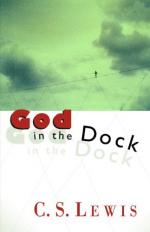
|
| Name: _________________________ | Period: ___________________ |
This test consists of 15 multiple choice questions and 5 short answer questions.
Multiple Choice Questions
1. Lewis suggests that arguments for or against God's existence are which of the following?
(a) Powerful.
(b) Foolish.
(c) Intricate.
(d) All incorrect.
2. The argument that human suffering proves that God does not exist is best described as which of the following?
(a) Syntactically unsound.
(b) A strawman argument.
(c) Begging the question.
(d) Prima facie.
3. What was Lewis' intent in his original writings about the pain of animals?
(a) To rebut arguments against God's existence.
(b) To provide a simple framework for discussion.
(c) To respond to a personal letter not meant for publication.
(d) To prove the superiority of mankind.
4. What surprised Lewis about the club that he formed?
(a) That it was so successful intellectually.
(b) That there are not more like it.
(c) That it grew so quickly.
(d) That it was imitated by many others.
5. The philosopher that Lewis responds to in Part I, Essay 23, "Must Our Image of God Go?" uses a metaphor that compares Jesus to which of the following?
(a) A vessel.
(b) A sign.
(c) A doorway.
(d) A window.
6. How does Lewis suggest that higher animals might be able to achieve immortality?
(a) By God's intervention.
(b) By evolving larger brains.
(c) By a process of selection.
(d) By becoming part of the family of man.
7. How does Lewis view the laws of the universe?
(a) As guidelines only.
(b) As having no exceptions.
(c) As having a few important exceptions.
(d) As unimportant types of experiences.
8. In Part I, Essay 8, "Laws of Nature", what was the woman praying for her son to survive?
(a) Terminal cancer.
(b) A surgery.
(c) Injuries from a car crash.
(d) A battle.
9. Which of the following is one word Lewis uses to describe religions that he views to be true?
(a) Fluid.
(b) Tough.
(c) Light.
(d) Thick.
10. If Jesus' claims about himself were false, what can be said about his moral teachings?
(a) They are irrelevant.
(b) They are unclear.
(c) They are invalid.
(d) They are unchanged.
11. According to materialism, reasoning is the result of what?
(a) Movements in the brain.
(b) Quantum uncertainties.
(c) Unknown physical processes.
(d) Classical physics.
12. According to Lewis, what is the impact of not praying on a particular subject?
(a) The meaning of the outcome will be incomprehensible.
(b) The result will be unfavorable.
(c) The outcome may be different.
(d) It has no affect.
13. Corineous asserts that Christianity is which of the following?
(a) Old-fashioned.
(b) Sophisticated.
(c) Adaptable.
(d) Barbaric.
14. Lewis contends that most people will realize that without Christianity what will happen to them?
(a) They will feel empty.
(b) They will be unable to lead good lives.
(c) They will feel more fulfilled.
(d) They will be able to lead moral lives.
15. Lewis hoped that his club would adopt what type of a political viewpoint?
(a) Libertarian.
(b) Liberal.
(c) Neutral.
(d) Conservative.
Short Answer Questions
1. What belief has had the biggest effect on the decrease in reports of miracles?
2. Lewis contends that real change in a person occurs in what way?
3. If Jesus' claims about himself were false, he would best be considered which of the following?
4. The content of Part I, Essay 20, "The Pains of Animals" is mostly concerned with what?
5. What justification does Joad give for his preference of belief in Part I, Essay 1, "Evil and God"?
|
This section contains 576 words (approx. 2 pages at 300 words per page) |

|




